By Nicole Mulvaney
Correspondent
The Senior Council held its third installment of its “Real Life" Series on life after college on Thursday Feb. 2, featuring speaker Rasheed Muse. Muse, a 1999 graduate of the College and current employee in Alumni Affairs, kick started the evening with his own personal insight into the real estate business and his journey into the market.

Becoming intrigued at an early age and continuing honing his skills at the College, Muse enrolled in a real estate class his junior year and eventually obtained his real estate license. After not being able to sell a house and only receiving letters from his landlords that boasted how great of a tenant he was, he had little to show for his real estate interest.
Now, renting out apartments in both N.Y. and N.J. to tenants of his own, Muse illustrated both the advantages and pitfalls of renting versus purchasing an apartment or home right out of college. Renting allows for easier mobility because the tenant is likely to be in a short term lease, and there is more flexibility on locations to choose from, although the property is essentially not theirs and there are limits to the types of modifications allowed to be made to the residence. Purchasing a home, however, transfers the majority of the responsibilities to the buyer, such as handling pest control problems, snow removal, uncooperative tenants, liabilities and vacancies. Buyers must first do their homework and inspect their property before committing to a purchase, according to Muse.
One of the most important factors used to determine one’s eligibility for renting and buying is credit score, which Muse stressed the importance of developing throughout his lecture. He urged students not to “make the mistake of signing up for a credit card that offers a free T-shirt as an incentive when you don’t have a job, yet take advantage of the $500 spending limit. Don’t be foolish.” He went on to mention five tips to establishing a respectable credit score, which include staying on top of your payment histories, managing your credit card debt, becoming informed about your payment length, realizing what type of credit card you possess and becoming tuned in to your credit card’s interest increases. “Never pay for something you can’t pay back and aren’t willing to diligently pay back in a reasonable time frame,” Muse instructed.
Essentially, Muse pointed out, the decision to either rent or buy your first apartment or home is a personal choice, and the pros and cons to both need to be weighed heavily. Before coming to a decision, Muse urges prospective renters and buyers to first get pre-qualified at the bank to determine how much will be spent. They will then take into account such things as salary, savings, credit score and taxes so they can provide a rough estimate of what is affordable. After all, Muse reinforced, “Time is money.”
Although many college graduates are eager to establish themselves in society and live on their own immediately after graduation, Muse encourages students to do the opposite. “Be smart. Be resourceful. Save as much as you possibly can by living with parents or others who are willing to house you, despite the possible downsides such as sibling confrontations and limitations on curfews,” he said.
After the informative lecture, attendees appeared pleased by Muse’s tips and advice. Julia Ireland, senior Journalism major, found that the biggest take-home for her was the information on “how to go to a bank and figure out how much you can afford when you’re looking for your first house.” Junior chemistry major, Kristen De Meester liked other aspects of the lecture, such as “'Saving your money, establishing your credit -those were the two main take-homes for me. A lot of people don’t understand how to avoid spending money they don’t have.”
Junior business major Tim Oppelt commented, “(Mr. Muse) seems like a very respectable man and a personal role model. He has experienced real estate before so you feel more prepared because he’s telling you the facts on what to avoid rather than concentrating on the good parts.”






